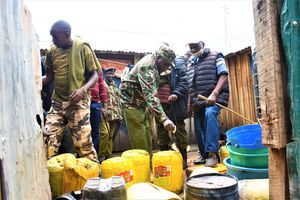
Deputy President Rigathi Gachagua.
The declaration by Deputy President Rigathi Gachagua that the government will introduce new brands of low- cost alcohol to replace those being kicked out of the market has elicited intriguing parallels touching on political correctness of manufacturers.
Of greater interest among economic and political pundits is Gachagua’s declaration that “we are now negotiating with new manufacturers on how to introduce to the market low cost, potent but healthy liquor brands that will be safe for human consumption”.
In a move reminiscent of returning fire with fire, the DP has been understood to mean that cheap liquor is good only if registered afresh and new conditions put in place—and the brewers be brought into the tax family.
The second in command said the government was in the process of negotiating with registered manufacturers to get supply licenses for ‘cheap but safe potent alcoholic drinks’ that will not kill consumers.
Mr Gachagua said both security and market surveys have shown that demand for low-end liquor is huge, which the death merchants take advantage of by adding all sorts of concoctions that end up ravaging the population through death.
The DP said the government will enter into concessions with the taxman to see what rebates can be extended so as to make the production of safe low-end liquor a reality.
In 2010, the then Naivasha MP John Mututho came up with the Alcoholic Drinks Control Act that sought to compliment former President Mwai Kibaki’s efforts to rid the market of illicit brews and instil discipline in the general trade of intoxicating Kenyans.
On February 7, 2010, Kibaki had lamented that the country had seen a surge in illicit brews consumers owing to unaffordable beer prices in the market.
He was speaking during speaking during the commissioning of East African Breweries Limited’s (EABL) new Sh2.8billion brew house and bottling line at its Ruaraka complex.
“To avoid this problem, the brewing industry should develop low-cost beers made under hygienic conditions for the budget-conscious consumers as a substitute for illicit brews,” he said, adding that the illicit liquor market share had hit an alarming high of 45 percent, especially in the rural and informal settlements.
Also Read: DP’s war on alcohol misplaced
Kibaki said he had instructed economic policy makers to ensure tax reprieve to help brewers come up with clean alcoholic brands affordable to those hooked to illicit brews.
Exit Kibaki and in came President Uhuru Kenyatta in 2013, who in 2015 ordered all Mt Kenya politicians to lead raids on all suspected dens of Moonshine and destroy them.
In 2017, the menace had reached alarming levels and while officiating the groundbreaking processing line for EABL in Kisumu, Kenyatta announced that the taxman would be asked to map the production of cheap alcohol.
“It has reached a point where we have to ask ourselves how best to address the issue of illicit brews market that is killing our people in big numbers and destroying our future…The issue of affordability has always come up and manufacturers are always complaining of cost of production,” he said. “That is the balance being sought.”
Some 14 years after Kibaki gave the roadmap to rid the market of killer brews, Gachagua is speaking the same language.
“Talks are ongoing with leading alcoholic beverage manufacturers over production of ideal safe brands that will be affordable to our humble consumers, ” he said.
The DP is issuing the same decrees, same orders and same articulations that so far have not worked despite the enactment of the Mututho law.
On Friday, the State moved to firm its grip on the second generation manufacturers with an order that 24 of the 29 risk losing operation licences if they do not comply with the listed regulations and guidelines within 21 days.
The 24, including Keroche Breweries Ltd of Nakuru Senator Tabitha Karanja, had their licences suspended, pending the assessment by the Interior ministry.

Deputy President Rigathi Gachagua with his spouse Pastor Dorcas Rigathi during the funeral service for the 17 victims of the killer brew at Kangai Primary School grounds in Mwea Constituency, Kirinyaga County.
Only two; Kenya Nut Company Limited and UDV, passed the vetting by the multi-agency team and were allowed to continue with production.
Kenya Wine Agencies Ltd (KWAL), Savanna Brands Company Ltd, and Patiala Distillers Kenya Ltd were given a chance to rectify the requirements that they had not met.
The 24 include Two Cousins Distillers, Corobus Africa Products, Lyniber Supplies, Elle Kenya, Zheng Hong (K), Rift Valley Brewing Company – Thika, FRM EA Packers , Manchester Distillers, Kedsta Investment, Julijo Investment, Platinum Distillers andLondon Distillers Kenya.
It is an approach that National Assembly minority leader Opiyo Wandayi has branded “political and economic sabotage where it has paradoxically brought about serious suspicions of political correctness in registration of new manufacturers”.
He said: “The Gachagua policy is being implemented through forceful closure of licensed alcohol businesses, a move that will only compound the problem of joblessness and escalate crime levels.”
Mr Opiyo said the government intentions need to be scrutinised with a goal of forcing a review and termed the war as “noble but ill-conceived policy that reek of systematic plan to kick out established businesses so as to usher in politically correct ones”. Former Mt Kenya Members of County Assembly Caucus chairman Charles Mwangi said “the pattern is now out and too consistent to ignore and that is where the big problem is”.
“The pattern has been that Kibaki through Mututho kicked out the previous President Daniel Moi low-end liquor brewers, Kenyatta came and kicked out Kibaki regime brewers and Ruto is now kicking out Kenyatta era brewers,” Mwangi said, adding that “those are perceptions hard to ignore when there has been a law in place that is never operationalised but actors resorting to issuing verbal decrees and demanding that county assemblies make inferior laws to effect a common plan”.
He said Mr Gachagua’s announcement that the State will partner with manufacturers to come up with affordable and safe alcohol simply means the market will continue intoxicating the low-end population.
Mr Mututho told Nation that there is nothing called low-end alcoholic drinks if they will continue being identified with the usual brands. “The cheapest any brand in the measure of 250 milliliters going by vodka, cognac or brandy would be over Sh500. Those are the brands available now,” he said.
He wondered “how cheap is cheap” in the declaration that the brews being fought will be replaced with safer ones of the same cost.
The war against the said killer brews has attracted sentiments from senior county government leaders who feel they are being denied political goodwill and loyalty owing to pressure by investors in the stock market seeking to control the huge market that is the demand for low-end liquor.
Kirinyaga Jubilee Party Chairman Mr Muriithi Kang’ara said: “We hear some senior government officers claiming that the alcoholic drinks being fought were products of a former powerful technocrat in the Kenyatta administration who became very wealthy and did not pay taxes, hence giving us an idea that this might be a market gain war, not premised on saving any soul from death.”
Mr Kang’ara added that it was important to rid the market of killer brews without introducing others from “politically correct individuals”.
This came even as some cultural purists insisted that acceptance of traditional brews like Muratina will help fill the void being left by the effects of the ongoing crackdowns.
Mr Gachagua said traditional brews must not be placed in the commercial market and their acceptance is not for purposes of making people drunk. “Traditional brews were only meant to help communities exercise their cultural functions and not for get people drunk.”
He said the war against killer brews has since posted a 70 percent success. “Earlier, we had people getting knocked off silly by a pint of Sh30 only”.










